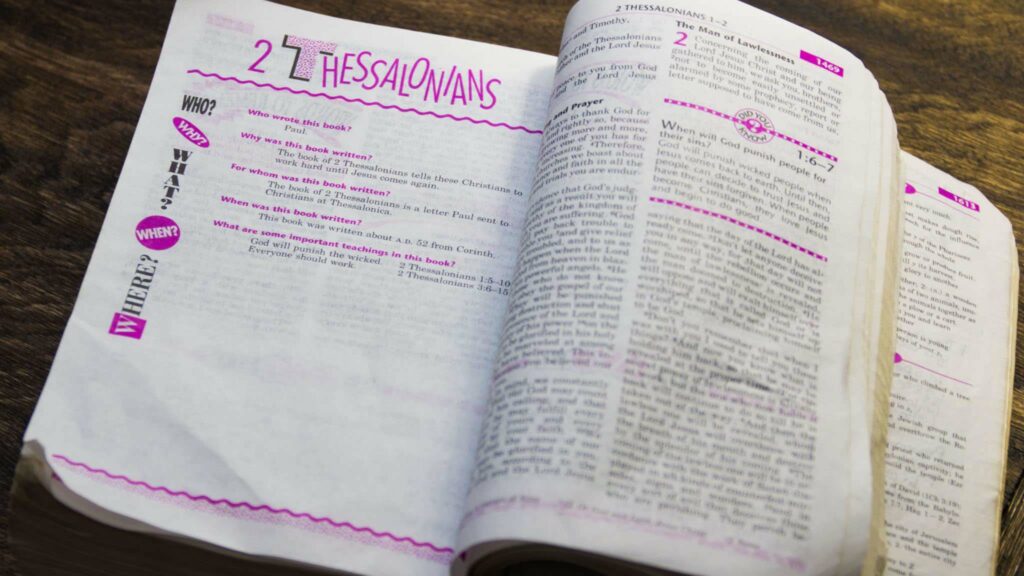
Building a Bible-Based Faith (That Isn’t Terrible)
“Test everything; hold fast what is good.”
– 1 Thessalonians 5:21
When I first started to realize that I was attracted to guys, a tiny crack appeared in my faith: how could a loving God knit me together in my mother’s womb then give me these desires for love, intimacy, and family with no righteous outlet to express them?
I’d been told that “homosexuality” was sinful, but I was never quite sure why. I needed to be sure, so I turned to the Bible. That was terrifying. Who was I to question what my church leaders acted like was common knowledge? And then I stumbled upon 1 Thessalonians 5:21 and I realized that questioning my beliefs wasn’t heresy, it was Biblical!
It took me YEARS to sort out that being LGBTQ was not only “ok” but an important part of the diversity of God’s creation. (If you want a peek at what I learned during the process, check this out)
Now that I know it’s ok to be queer — despite what some religious leaders say — I asked myself: what else were they wrong about?
Figuring out I was queer was an invitation to question my faith and to take a fresh look at “what the Bible” says about so many things.
Thank God I’m queer, because I have discovered in the Bible — and the community, experience, expertise, and traditions of Christians across millennia — a faith that is liberating and life-giving… and so much more alive than the evangelical faith of my childhood.
Conservatives talk a lot about being “Bible-believing” or having a “Bible-based” faith.
Too often that’s code for “My interpretation of Christianity is right and everyone who doesn’t measure up is sinful and going to hell.”
While I think it’s entirely possible to be an upstanding, moral person without ever turning to the Bible (or even believing in God!), I’m not ready to let go of this sacred text.
When I look at the Bible, here’s what I see.
The Spirit of the Lord is upon me,
because the Lord has anointed me.
He has sent me to preach good news to the poor,
to proclaim release to the prisoners
and recovery of sight to the blind,
to liberate the oppressed,
and to proclaim the year of the Lord’s favor.
– Luke 4:18-19
Jesus begins his public ministry by quoting from the prophet Isaiah (Isaiah 61:1-2, to be specific).
In doing so, he roots his ministry in his Jewish faith and, more specifically, in the Hebrew prophets.
If you’ve asked “What did Jesus come to do?” or “Why did God send Jesus?” … well Jesus answers that question himself in Luke:
- to bring good news to poor people
- to set prisoners free
- to give sight to the blind
- to liberate the oppressed
- and to usher in God’s abundance
But Jesus doesn’t want to go at it alone. He begins calling disciples to join him in his ministry. Jesus isn’t looking for converts, though.
“Come, follow me,” he said, “and I’ll show you how to fish for people.” (Matthew 4:19)
He’s looking for doers to join him in the work of his ministry. And what is that ministry?
Throughout the Hebrew and Christian scriptures, we get a look at God’s priorities. When I look at the ministry of Jesus, I don’t see a departure from the Hebrew scriptures, I see a continuation of them.
In the Hebrew and Christian scriptures, there are 2,350 verses about money, 300 about social justice and the poor, and even 24 about immigration.
But it’s not really about plucking verses out of context or tallying up the number of verses about this subject vs that subject. To take the Bible seriously and faithfully, you need to know what to do with it. What are the central themes and what are the exceptions? What are commandments and what might be examples of humans messing up, despite their best intentions? What taps into the divine and what is just a reflection of a time-bound, cultural norm?
In Deuteronomy,
I have set life and death, blessing and curse before you. Now choose life.
In Amos,
I hate, I despise your feasts,
and I take no delight in your solemn assemblies.
Even though you offer me your burnt offerings and grain offerings,
I will not accept them;
and the peace offerings of your fattened animals,
I will not look upon them.
Take away from me the noise of your songs;
to the melody of your harps I will not listen.
But let justice roll down like waters,
and righteousness like an ever-flowing stream.
In Luke, when asked what one must do to gain eternal life, Jesus shared a story that ended with the Samaritan taking care of the injured man and paying for his healthcare … “Go and do likewise” was Jesus’s answer.
In John,
I came so that they could have life—indeed, so that they could live life to the fullest.
In Acts,
All the believers were united and shared everything. …There were no needy persons among them
There’s a whole lot in the Hebrew and Christian scriptures: letters, commandments, poems, stories, parables, and even some visions.
What are we to make of all of these?
Genesis 1 ends with, “God saw everything he had made: it was supremely good” and Revelation ends with “The grace of the Lord Jesus be with all.” When you look at Scripture — from Genesis to Revelation — what you see is that God calls us to be faithful by loving ourselves and taking care of each other.
Jesus seems to agree. In Matthew 22, he says,
You must love the Lord your God with all your heart, with all your being, and with all your mind. This is the first and greatest commandment. And the second is like it: You must love your neighbor as you love yourself. All the Law and the Prophets depend on these two commands.
If you aren’t drawing yourself and others closer to God, if you aren’t filled with love for God, for yourself, and for others, you’re not following Jesus’s commands.
Jesus tells us in Matthew 7 that “by their fruits you will recognize” whether a religious teaching is true or not.
The fruits of anti-LGBTQ theology reveal its falseness: depression, despair, suicide, fractured families, loss of faith, bullying, harassment. The fruits of affirming theology testify to its rightness: a return to faith, a healing of relationships, and a vibrance and resurgence in church life.
But it’s not just about being “LGBTQ affirming” or not.
Does your theology put you at odds with your mind, soul, heart, or body? Does your theology sow division in your family, community, nation, or world? Does your theology excuse or encourage violence? Does your theology exacerbate your mental health problems?
Or does it lead you to life and joy? Does it comfort you? Does it give you hope? Does it lead you to treat others well?
Judge your theology by its fruits.
How to figure out an integrated, Bible-based faith that is life-giving
It took me studying religion in college, being trained by religious and civil rights leaders, engaging in full-time activism across the country for months, reading and studying countless books by pastors, scholars, theologians, and activists; and studying under mentors. It took Fr. Shay going to seminary, continuing his education for a decade, working in churches for equally long, and pursuing independent study.
But it shouldn’t require that much of an investment just to read the Bible well and put it into practice. That’s why we are distilling all of our expertise and experience down into self-study course on how to read the Bible: Journey into the Bible. You can learn more and register here.
Photo by tarnpulli
